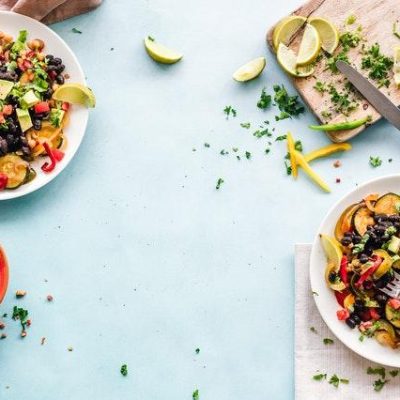Nutrition as we age
Eating to fuel our bodies is especially important as we age as it can affect how we feel but also help us to maintain healthy body weight and condition our bodies to fight off infection and reduce the risk of developing diseases.
As we age our muscle mass naturally decreases with age, which causes the metabolism to slow down. This means that you don’t need as many calories to sustain your lifestyle. Therefore, it’s important to personalize your caloric and nutritional needs based on if you need to lose weight or maintain a healthy weight.
Specific nutrients needed for our bodies to keep us healthy through the aging process include potassium, magnesium, calcium, vitamin D, vitamin B12, and dietary fiber.
Foods important to eat to support healthy bones as you age and protect against developing osteoporosis, and bone fractures it’s important to eat foods rich in vitamin D and calcium.
Vitamin D – food sources include fortified milk and milk products, fatty fish such as salmon and tuna and fortified cereals.
Calcium – food sources include milk and other dairy products, some forms of tofu, dark-green leafy vegetables, soybeans, canned sardines and salmon with bones, and calcium-fortified foods.
Foods important to eat to support healthy skin as you age are foods that are rich in antioxidants called anthocyanin. Also, vitamin A, vitamin C, vitamin E, and omega 3 fatty acids are needed as well.
Antioxidants rich foods do well when combined with vitamin C foods for collagen production.
Vitamin C – Blueberries, Spinach, Tomatoes, Red bell peppers, pomegranates
Vitamin A – Sweet potatoes, broccoli
Omega 3 fatty acids – Fatty fish – salmon & sardines, walnuts
Vitamin E – Fatty Fish, avocados
Foods important to eat to protect heart health as you age, which will reduce the risk of developing chronic diseases such as high blood pressure, hypertension, and heart disease can be done by eating foods that protect your body from developing these diseases with the promotion of consuming more plant-based foods.
A diet utilizing fruits, vegetables, whole grains, legumes, nuts, plant-based protein, lean animal protein, and fish are good sources of nutrients from vitamin A, vitamin C and unsaturated fats which can help to lower bad cholesterol and triglyceride levels.
Some examples of heart-healthy foods are: Oatmeal, legumes, salmon, nuts and seeds, strawberries, grapes, spinach, legumes, berries, olive oil, avocados
Other important foods to eat to support healthy aging are:
Protein – It’s important to add protein to our diet as we age because our muscle mass naturally decreases, and you want to prevent muscle wasting. Specific foods that are good sources of protein can be found in meats, eggs, dairy products, legumes, tofu, and tempeh.
Vitamin B12 – Some people over the age of 50 have trouble absorbing the vitamin B12 found naturally in foods. Therefore, you may need to take vitamin B12 supplements and or eat foods fortified with this vitamin. Foods to focus on are meat, fish, poultry, eggs, dairy such as milk, and fortified breakfast cereals. If you are eating non-animal-based foods incorporating nutritional yeast and certain fortified non-dairy kinds of milk will be good.
Potassium – Potassium is a mineral that helps muscles contract, regulate fluid and mineral balance in body cells, and helps to maintain normal blood pressure by limiting the effect of sodium and bone loss as we age. Many different fruits, vegetables, meats, and dairy foods contain potassium. Foods high in potassium include bananas, dried apricots, lentils, and potatoes.
Magnesium – Magnesium keeps your immune system, heart and bones/bone density strong. It’s a mineral generally found in foods containing dietary fiber, such as green leafy vegetables, whole grains, legumes, and nuts and seeds. Breakfast cereals and other fortified foods often have added magnesium. Magnesium is also in tap, mineral or bottled drinking water.
Probiotics – can help with keeping you regular and strengthen the immune system. Food sources you can get them from are fermented foods like yogurt or sauerkraut. You can take supplements if fermented foods are not your thing.
Fiber – helps protect against strokes, helps you stay regular with bowel movements, and lowers your cholesterol and blood sugar levels. Consuming foods such as fruits and vegetables will help you meet your daily fiber needs.
The importance of drinking water and staying hydrated as we age…
Staying hydrated helps to maintain every system in our body to work from cells functioning, to our body’s ability to fight off infection and prevent dehydration.
Also, as we age dehydration can occur as the kidneys become less able to hold water. Individuals’ water intake varies based on one’s physical activity and exposure to heat. If it’s warmer outside, there is an increased risk of dehydration, especially in older adults. It is good to consume ~9 cups of water a day
Lastly, general tips for a healthy, balanced diet as you age…
Promoting a more plant-based diet, along with including whole grains, lean protein is key to helping with the aging process no matter if your 40, 50 or 60+ years old.
Its recommended that incorporating more whole foods into your diet while reducing the number of processed foods consumed from our diets. I also like to promote individuals to include more plant-based meals by making half your plate full of fruits & vegetables and whole grains. The key to good health is consuming a variety of foods to ensure we get a wide array of nutrient-dense foods that are high in nutritionally.

